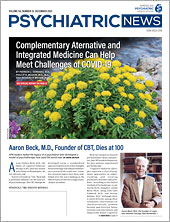“Given the intersectionality of social determinants, leaders in multiple disciplines, not just psychiatrists, who are engaged in frontline care must work together more effectively than in the past.” So said Jacqueline Feldman, M.D., the associate medical director of the National Alliance on Mental Illness, a professor emerita at the University of Alabama at Birmingham Department of Psychiatry, and moderator of a session titled "Community Leadership and Frontline Care” at APA’s 2021 Mental Health Services Conference in October.
Panelists in the session offered tips for providing community leadership based on their experience and the success of their programs.
Kenneth S. Thompson, M.D., chief medical officer of the Pennsylvania Psychiatric Leadership Council, stressed the importance of recognizing the integral part mental health care plays in health care overall. He called upon psychiatrists to be proactive in determining the role they will play when working in primary care systems.
“The opportunity for leadership is quite high but we have to figure out where to steer ourselves. Psychiatry needs to stop seeing primary health services as something that is other than what we do in psychiatry,” Thompson said. “I think it important that psychiatry think more deeply about its relationship with primary health services. We have made a lot of hay saying that there is no health without mental health. However, there is no mental health without health. Psychiatric care is a foundation of primary health services.”
Rochelle Head-Dunham, M.D., an addiction psychiatrist who currently serves as the executive and medical director for the Metropolitan Human Services District in New Orleans focused on equity and cultural anchoring of frontline care. She is an associate professor at Tulane School of Medicine and Louisiana State University School of Medicine.
“If we dismiss the cultural differences among our groups of [patients], then we miss our capability to get great outcomes from service and delivery systems,” Head-Dunham said. She added that this extends to patients’ quality of life as it is affected by social determinants of health that health and mental health professionals often don’t see, plan for, or prioritize.
Head-Dunham also discussed the value of peer support specialists with personal lived experiences that enable them to support others in their treatment and recovery.
“Many people are much more comfortable talking to someone who has walked in their shoes,” she said, adding that medical and academic credentials “mean nothing” if health and mental health professionals cannot develop rapport with their patients.
Amir Ahuja, M.D., director of psychiatry at the Los Angeles LGBT Center and president of the Association of LGBTQ Psychiatrists, discussed integrated care. He noted that medical and behavioral problems have bidirectional negative effects, meaning they influence and exacerbate one another. He said that health and mental health professionals should be aware that the rates of medical illness are higher in patients with serious and persistent mental illness.
“Specialists and primary care doctors are going to see these patients [whose conditions] will be worse than those of their counterparts without serious and persistent mental illness,” Ahuja said.
Ahuja noted four modifiable risk factors that are more common in people with behavioral health issues—tobacco use, substance use, poor diet, and a lack of physical activity. He added that many people with serious and persistent mental illness do not receive the health care they need because of several factors: stigma, chronic stress, economic hardship, and symptoms of behavioral health problems that reduce compliance and patient self-advocacy. ■

